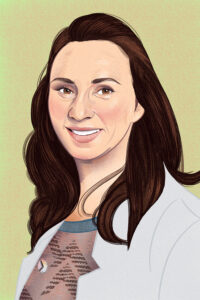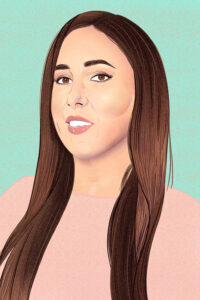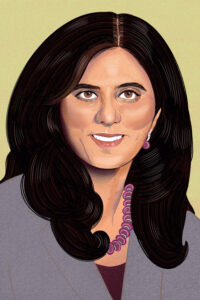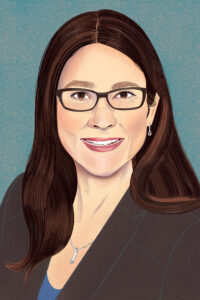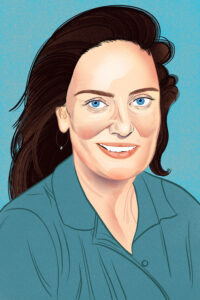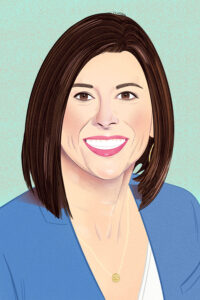
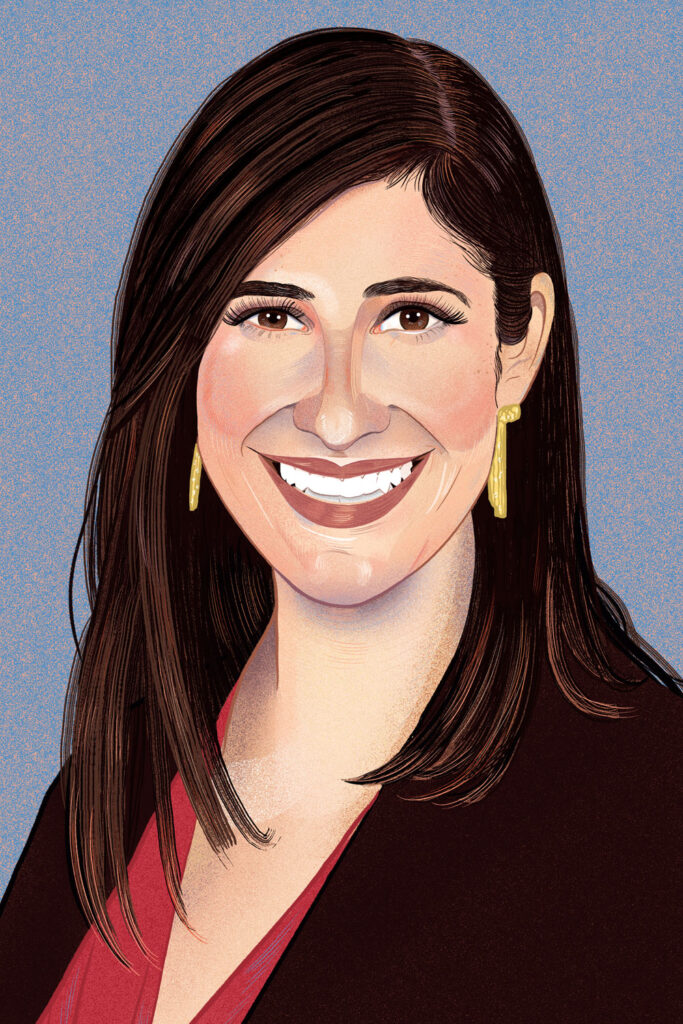
LEADERS IN CYBERSECURITY
Lauren Karellas
Principal, Deloitte United States
Lauren is a Principal in Deloitte’s Cyber & Strategic Risk practice, helping U.S. Federal Government clients navigate their most complex cyber challenges. She started her career at Deloitte as an intern while attending Michigan State University for undergrad. Lauren currently leads teams providing a wide range of cyber services to Federal financial regulatory and enforcement organizations. She has led Talent & Inclusion for over 2,400 Cyber & Strategic Risk practitioners, where she focused on enabling a world-class talent experience and establishing programs that enable an inclusive and connected culture. Lauren is from Detroit, MI, and resides in Bethesda, Maryland, with her husband, Andy, and their dog Mia. They are thrilled to be welcoming a baby boy in May 2023.
What does a typical day of work look like for you?
My day usually consists of connecting with clients, checking in with my teams on various career topics and collaborating with other Deloitte leaders on managing our business. After work, we go on a family walk with the dog to exercise for 20-30 minutes and cook dinner. I love to cook dinner after work as it helps me unwind from the day and be creative.
What aspects of your career journey have taken you by surprise?
I often look back at where I started and where I am now, and it continues to surprise me how my skills and abilities have evolved so much. I started my career at Deloitte, supporting our audit business and performing control assessments associated with Sarbanes-Oxley compliance for publicly traded companies. Now, my teams are solving some of the most critical and technical cybersecurity challenges faced by the U.S. government. It’s certainly not the path I had expected as an intern at Deloitte with a degree in marketing.
Tell us about the cyber project you're most proud of working on in your career.
One of the projects I am most proud of was for a federal government agency and the complex identity and access management challenges we were solving. Our project turned the table on a global security risk and significantly improved the user experience on a global scale. The best cybersecurity projects, in my experience, are those that enable greater security while also making things easier for end users and customers.
How has public perception of cybersecurity changed over the course of your career, and how do you predict in the future?
Cybersecurity was not even a term that existed when I started in this field, and now it’s a topic that is on most organizations’ top five business priorities. As our lives continue to shift into all things digital, cybersecurity will continue to be a must-have business priority and a prerequisite for any business to succeed.
Tell us about your first job (can be anything!) and one lesson you might have learned from it.
When I was 16, I worked in the business office of a members-only restaurant and social club for the Arab-American community in Detroit, Michigan, that my family belonged to. I was responsible for collecting, recording and depositing membership dues through paper checks. I felt so much responsibility and accountability for the safe handling of checks that I devised creative ways to double and triple-check all of my work to ensure everything was accounted for and that no mistakes were made. Today, I’m known for my attention to detail and a deep sense of accountability with my clients and teams.
What’s one piece of advice you’d give your younger self about getting started in cyber?
I would advise my younger self to trust in myself more and let my confidence pull me through the learning curve. I was so self-conscious about working in cybersecurity without a technical college degree and constantly had imposter syndrome. I eventually realized that most people around me had also learned and lived through cybersecurity events in real-time rather than coming in knowing everything. Becoming an expert in something isn’t as complicated as I had made it out to be in my head. With a strong drive, willingness to learn and be comfortable with being uncomfortable, I know that I can take on any cybersecurity challenge with confidence and the help of really smart people around me.
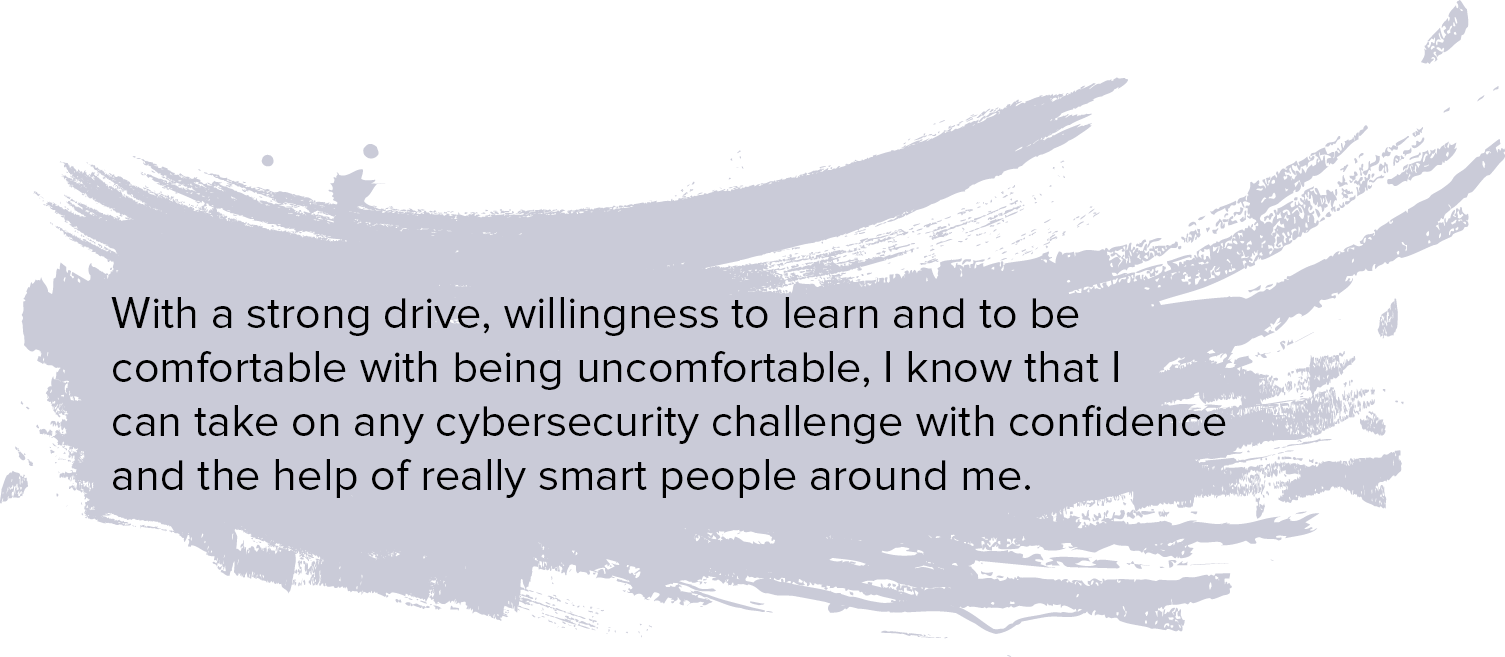
Tell us about a role model or mentor who has helped shape your career.
When I was a senior manager, a female leader at Deloitte who was a mentor of mine and eventually a sponsor approached me about my readiness to join the partnership at Deloitte. I was in full-on denial that this was something in the realm of possibility at my relatively young age at the time. This mentor helped me see the potential in myself that others were seeing and helped catapult me to being ready to develop my business case for admission to the partnership, regardless of age, gender or any of the other biases I had subscribed to at the time.
A meeting gets canceled and you have a surprise 30 minute window of free time — how do you spend it?
If I’m working at home, I’d head outside for a walk and fresh air and maybe play with the dog if she’s around and not napping (which she is most likely doing). If I’m in the office, I’d walk around and see who I can bump into to catch up and maybe head outside for a coffee or bubble tea.
What are the ways you stay grounded and take care of yourself?
I try to set boundaries during the day to ensure my personal needs are met. Otherwise, the calendar takes over. I block time on my calendar to have lunch and catch up on email mid-day, and I block time after-hours to make sure I can exercise and cook dinner with my family. Unless it’s urgent, I try not to have meetings after hours and set this example for my teams as well. Outside of work, I try to have something fun on the calendar periodically, whether it’s a comedy show, a reservation at a new restaurant or a weekend trip.
When you think about your personal legacy as a leader, what do you hope people will remember?
I want to be remembered for my genuine care for others’ well-being, happiness and growth. Whether it’s a colleague, client, friend or family, I enjoy serving others and hope that’s reflected in my legacy. It’s a big reason I chose a career in professional services.
